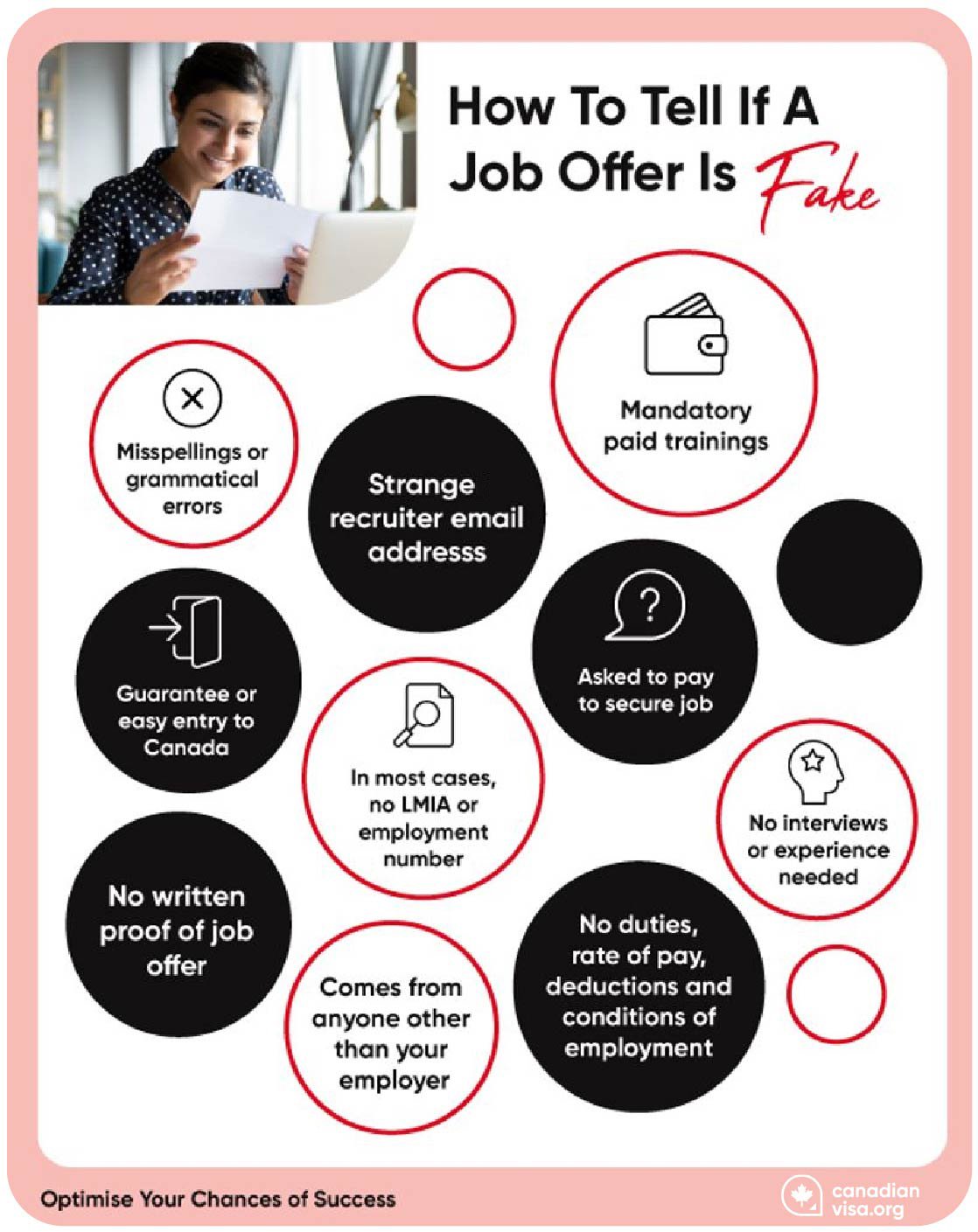In today's interconnected world, the allure of international job opportunities is stronger than ever. Canada, known for its high standard of living and diverse job market, attracts thousands of job seekers from around the globe. With the increasing demand for Canadian jobs comes the rising threat of job offer scams. Fraudsters prey on the dreams of aspiring professionals, sending out fake job offers that can lead to significant financial loss and emotional distress.
This article will guide you through identifying whether a job offer letter in Canada is real or fake, helping you protect yourself from falling victim to such scams.
The Importance of Verifying a Job Offer

Receiving a Canadian job offer is an exciting milestone, especially from a company in a country like Canada, known for its stable economy and high quality of life. But this excitement can quickly become a nightmare if the job offer is fake.
Scammers use sophisticated tactics to mimic legitimate companies. They often create fake websites and email addresses and even use the names of real employees to make their offers seem credible.
The consequences of falling for a fake job offer can be severe, ranging from losing money to having your personal information stolen and used for fraudulent activities.
Reasons Verifying a Canadian Job Offer is Crucial
Financial Security
One of the most immediate risks of falling for a fake job offer is financial loss. Scammers often ask for money upfront, disguised as processing fees, visa applications, or even training costs. These payments are usually presented as necessary steps to secure the position, preying on the job seeker's desire to quickly finalize the offer. Once the payment is made, the scammers disappear, leaving the victim out of pocket and with no job. The financial hit can be significant, especially if large sums are involved, or if the individual is already in a vulnerable financial position.
Protection of Personal Information
Beyond financial loss, the theft of personal information is another serious consequence of falling for a fake job offer. Scammers may ask for sensitive details such as your passport number, social insurance number, bank account details, or even personal identification documents under the guise of pre-employment background checks or payroll setup. Once this information is in the wrong hands, it can be used for a range of fraudulent activities, including identity theft, unauthorized financial transactions, and the opening of credit accounts in your name. The ramifications of identity theft can be long-lasting, affecting your credit score, financial stability, and peace of mind.
Emotional and Psychological Impact
Beyond the enormous losses, the emotional toll of being scammed can be significant. The realization that you've been deceived can lead to feelings of embarrassment, betrayal, and self-doubt. This can be especially damaging when it involves a job offer, which often represents hope, progress, and the prospect of a better future. The psychological impact can affect your confidence in future job searches, making you more hesitant to pursue opportunities and more suspicious of legitimate offers.
Wasting Time and Resources
Job searching is a time-consuming process that requires considerable effort. Falling for a fake job offer means losing time that could have been spent pursuing genuine opportunities and potentially investing in preparations such as relocation plans, securing accommodation, or even resigning from your current position. All of these efforts become wasted, setting back your career progress and personal plans.
Legal Implications
In some cases, responding to a fake job offer can have legal consequences. For example, if you unknowingly provide false information or engage in illegal work practices under the direction of scammers, you could find yourself in legal trouble. Even though you may have been an innocent participant, the consequences can still be severe, particularly when dealing with immigration laws or employment regulations in a foreign country.
Maintaining Trust in the Job Market
The prevalence of job offer scams can erode trust in the job market, making it harder for legitimate employers to attract talent. By verifying job offers, you contribute to a more transparent and trustworthy job market, helping to root out fraudulent practices. This protects you and helps safeguard the integrity of the job market as a whole, ensuring that other job seekers don't fall victim to similar scams.
Red Flags of a Fake Job Offer Letter

We've compiled a list of things to look out for when you see a job offer letter.
Misspellings or Grammatical Errors
A common sign of a fake job offer letter in Canada is the presence of numerous misspellings or grammatical errors. Since English and French are the official languages of Canada, a genuine job offer letter from a legitimate company will be well-written and free of such mistakes. If the letter contains strange spelling errors, awkward phrasing, or improper grammar, it's a strong indication that the offer might be fake. While occasional minor errors can occur, a job offer riddled with them should be approached with caution. Remember, if it seems too good to be true, it probably is.
Strange Recruiter Email Address
A real job offer letter in Canada will never be sent from a personal or suspicious email address like recruitment@gmail.com. Scammers often use odd email addresses that don't include the company's official domain name, like recruitment-canada@randomdomain.com, to deceive job seekers. They may also steal email templates from legitimate companies and make slight modifications, such as adding hyphens or changing the domain name, to create the illusion of authenticity.
A genuine job offer will always come from a company's official email address. If you suspect the email is not from a legitimate Canadian company or recruitment agency, take the following steps:
- Conduct a job search for the position and the company.
- Verify the existence of the company's website, but be cautious of cloned or fake websites.
- Use websites like Scam Adviser to check the legitimacy of the website.
- Verify the job offer letter through official government sources such as Immigration, Refugees and Citizenship Canada (IRCC) and Employment and Social Development Canada (ESDC).
Mandatory Paid Training
If a recruiter informs you that you must pay for training to secure a job in Canada, it's almost certainly a scam. No legitimate Canadian employer or recruiter will ask you to pay for mandatory training as a condition of employment. Instead, most Canadian companies provide on-the-job training at their own expense. Any request for payment upfront should be treated as a major red flag.
Guarantee or Easy Entry to Canada
Be wary of any recruitment agency or business that claims they can guarantee a work visa or entry into Canada. If a job offer promises easy or guaranteed entry, it is almost certainly a scam.
Asked to Pay to Secure Job
Just as a recruiter cannot guarantee your entry into Canada, a legitimate recruiter will never ask you to send money to secure a job. This practice is not only unethical but also illegal. If someone asks for payment in exchange for a job in Canada, cease all communication immediately and report the incident to the appropriate authorities. This is a clear sign of extortion and should be dealt with promptly.
No Written Proof of Job Offer
If you receive a job offer for a Canadian position over the phone or are pressured into believing that you don't need a written job offer letter, you're likely dealing with a scam.
For foreign workers, a written job offer letter is essential, whether you are a permanent resident or a temporary worker. This document is required to claim Comprehensive Ranking System (CRS) points under immigration programs like Express Entry. The job offer letter is crucial for applying for a work visa if you plan to work in Canada temporarily. Never accept a job offer without proper documentation.
No LMIA or Employment Number Provided
In many cases, particularly for foreign workers, a job offer in Canada requires a Labor Market Impact Assessment (LMIA). This document shows that the employer could not find a Canadian citizen or permanent resident to fill the position. If you receive a job offer, it's important to carefully review the letter to ensure it includes the necessary information, such as your employment number. This number is required when applying for your Canadian visa. The absence of an LMIA or employment number is a significant warning sign.
Missing Job Details Like Duties, Rate of Pay, Deductions, and Conditions of Employment
A legitimate job offer letter for a position in Canada will include detailed information about the job. This should cover:
- A comprehensive job description, including the skills, duties, and responsibilities required for the role.
- Your rate of pay or salary, including any deductions.
- Work hours and the location of your job. Conditions of employment.
The letter should also be printed on official company letterhead, complete with contact information. Ensure the employer or recruiter is reachable, as scammers often use fake addresses or telephone numbers to appear legitimate.
Job Offer Sent by Anyone Other Than Your Employer
Unless you work with a recognized recruitment agency, your job offer letter should come directly from your prospective employer. Any job offer communicated by an unknown third party could be fraudulent. Always ensure that your job offer is credible, especially when applying for a job in Canada.
No Interviews or Experience Required
A job offer that doesn't require an interview or experience is a major red flag. Canada's job market is highly competitive, and employers seek skilled and experienced workers. If a job offer promises a high salary with no interviews or experience needed, it's likely a scam. Canada's immigration system evaluates applicants based on factors such as:
- Age
- Language skills (English and French)
- Education
- Work experience
- Ability to settle in Canada (e.g., family in Canada, proof of funds)
If the job offer bypasses these critical criteria, it's probably not legitimate. Always be cautious when assessing job offers that seem too easy or offer unrealistically high rewards.
How to Verify a Job Offer Letter in Canada

If you've received a job offer letter in Canada or even before you've made your way here and are still determining its legitimacy, there are several steps you can take to verify its authenticity. These steps will help you confirm the offer is genuine and protect you from potential fraud.
Research the Company
Start by researching the company online. Visit their official website, check their contact information, and look for reviews or news articles about them. A legitimate company will have a professional online presence. Be wary if the company's website is poorly-made or lacks crucial information such as a physical address, phone number, or contact details for the HR department.
Contact the Company Directly
If you're still unsure about the offer, contact the company directly using the contact information provided on their official website—not the contact details listed in the job offer letter. Ask them to confirm whether the offer is legitimate. Many companies are aware of scams involving their name and can verify the authenticity of the job offer.
Check the Company’s Address
Verify that the company's address is a real, physical location in Canada. You can use online maps and business directories to check the address provided in the job offer letter. If the address leads to a vacant lot, residential area, or a different business, this could indicate a scam.
Look for an LMIA or IRCC Documentation
For many jobs in Canada, particularly those involving foreign workers, an LMIA from Employment and Social Development Canada (ESDC) or approval from IRCC is required. If the job offer mentions these documents, ask to see a copy. You can also contact ESDC or IRCC directly to verify the legitimacy of the documents.
Cross-Check the Offer with Job Portals
Check reputable job portals and company career pages to see if the job is listed. If the position isn't listed on these platforms, or if the details don't match, it could be a sign that the offer is fake.
Review the Employment Contract
A genuine job offer letter is usually followed by an employment contract. Carefully review the terms and conditions outlined in the contract, and ensure they match what was discussed during the hiring process. If anything seems off, seek clarification before proceeding.
What to Do If You Suspect a Job Offer is Fake
If you're new to Canada and suspect a job offer letter is fake, it's essential to act quickly to protect yourself and your future. Scammers often target newcomers who may be unfamiliar with Canadian job market practices. We take a look at what you should do if you find yourself in this situation.
Stop All Communication
If you suspect the job offer is fraudulent, immediately stop all communication with the sender. Do not provide any further personal information, and under no circumstances should you send any money. Scammers often try to manipulate their victims through continued contact, so it's crucial to cut off communication as soon as you realize something is wrong.
Report the Scam
Reporting the scam is critical to prevent others from falling victim. In Canada, you can report job scams to the Canadian Anti-Fraud Centre (CAFC), which specializes in dealing with fraud cases. If a legitimate company's name was used in the scam, notify them as well. They may be able to take action to warn others and prevent the scam from spreading.
Protect Your Identity
If you have already shared personal details like your Social Insurance Number (SIN), bank information, or passport details, take immediate steps to protect your identity. Contact your bank to monitor your accounts for any suspicious activity, and notify the credit bureaus in Canada (Equifax and TransUnion) to place alerts on your credit reports. You should also inform the Canadian government if your SIN was compromised, as they can guide you on steps to secure your identity.
Seek Legal Advice
For newcomers who may not be familiar with Canadian laws, seeking legal advice can be particularly helpful. If you have suffered financial loss or if your personal information has been compromised, a lawyer can help you understand your rights and guide you through the process of recovering from the scam. Many community organizations offer free or low-cost legal assistance to newcomers, so consider reaching out to them for support.
Warn Others
Sharing your experience can be a powerful way to prevent others from becoming victims of similar scams. You can do this by posting on social media, participating in community forums, or contacting local immigrant support organizations. Many newcomers rely on community networks for guidance, so your story could help others recognize and avoid fraudulent job offers.
Remember, navigating the Canadian job market can be challenging, especially for newcomers. If something feels off about a job offer, trust your instincts and take the necessary steps to protect yourself.
Tips for Safely Navigating the Canadian Job Market

The Canadian job market offers incredible opportunities, but it's important to approach it with caution to avoid falling prey to scams. Here are some tips to help you navigate the job market safely.
Use Reputable Job Portals
Stick to well-known job search platforms and company websites for employment opportunities. These platforms often have verification processes that help filter out fraudulent job postings.
Be Skeptical of Unsolicited Offers
Always be wary of job offers that come out of the blue, especially if you didn't apply for the position. A legitimate job offer will typically follow an application and interview process.
Verify the Employer
Before accepting any job offer, take the time to research the employer thoroughly. Check their online presence, read reviews from current and former employees, and verify their contact information.
Trust Your Instincts
Trust your instincts if something feels off about the job offer. It's better to walk away from a potentially fraudulent offer than to take the risk and face negative consequences.
Educate Yourself on Job Scams
Stay informed about the latest job scams and tactics used by fraudsters. The more you know about common scam methods, such as phishing emails, fake job postings, and legitimate companies' impersonation, the better you'll be able to recognize red flags. Consider following news updates from reputable sources, subscribing to newsletters from Canadian regulatory bodies, or joining online forums where job seekers share their experiences.
Consult Immigration and Employment Resources
As a newcomer to Canada, make use of resources provided by government agencies like IRCC and Employment and Social Development Canada (ESDC). These agencies provide valuable information on legal job offers, work permits, and your rights as a worker in Canada. Settlement agencies often offer free workshops and counseling for newcomers, helping you understand the job market and how to avoid scams.
Seek Advice from Trusted Sources
If you receive a job offer and are unsure of its legitimacy, consult with trusted individuals or organizations before making any decisions. This could include speaking with friends or family members who have experience in the Canadian job market or reaching out to a settlement service provider or a legal advisor. These sources can offer guidance and help you verify the authenticity of the job offer.
Avoid Sharing Personal Information Prematurely
Be cautious about sharing personal information such as your Social Insurance Number , banking details, or passport information during the initial job application process. Legitimate employers typically request such information only after you have formally accepted a job offer and completed necessary paperwork. Premature requests for sensitive information are a common tactic used by scammers.
Look for Red Flags in Communication
Pay attention to the tone and content of the communication you receive from a prospective employer. Watch out for generic greetings, overly informal language, or pressure to act quickly. Legitimate employers will usually communicate professionally and provide clear, detailed information about the role, the company, and the next steps in the hiring process.
Keep Records of All Correspondence
Maintain a record of all emails, messages, and documents related to your job search. If you ever need to report a scam or seek legal advice, having detailed records will be invaluable. This documentation can also help you track the legitimacy of an offer over time, as inconsistencies in communication may reveal fraudulent intentions.
FAQs
Is There a Difference Between an Offer of Employment and a Job Offer Letter?
Yes. An offer of employment and a job offer letter are related but distinct terms in the hiring process.
Offer of Employment is a verbal or informal confirmation that a company is willing to hire you. It typically occurs after the interview process when the employer communicates that you have been selected for the position. This offer might outline the key details of the job, such as the position, salary, and start date, but it's not yet formalized in writing.
A Job offer letter in Canada is a formal, written document provided by the employer that officially outlines the terms and conditions of your employment. It includes details like your job title, salary, benefits, work hours, and other important terms. The job offer letter is typically sent after you accept the verbal offer of employment and serves as the official contract between you and the employer.
In summary, an offer of employment is the initial confirmation, while the job offer letter is the formal document that finalizes the hiring process.
Can I immigrate to Canada Without a Job Offer?
Yes, you can immigrate to Canada without a job offer through several pathways. The Express Entry system allows skilled workers to apply for permanent residency based on factors like age, education, and work experience without requiring a job offer. Provincial Nominee Programs (PNPs) in some provinces also accept candidates without a job offer, focusing on in-demand skills.
Family sponsorship, the Start-up Visa Program for entrepreneurs, and studying in Canada with a subsequent Post-Graduation Work Permit (PGWP) leading to permanent residency are viable options as well. Each program has specific requirements, so it's important to choose the one that best suits your situation.




